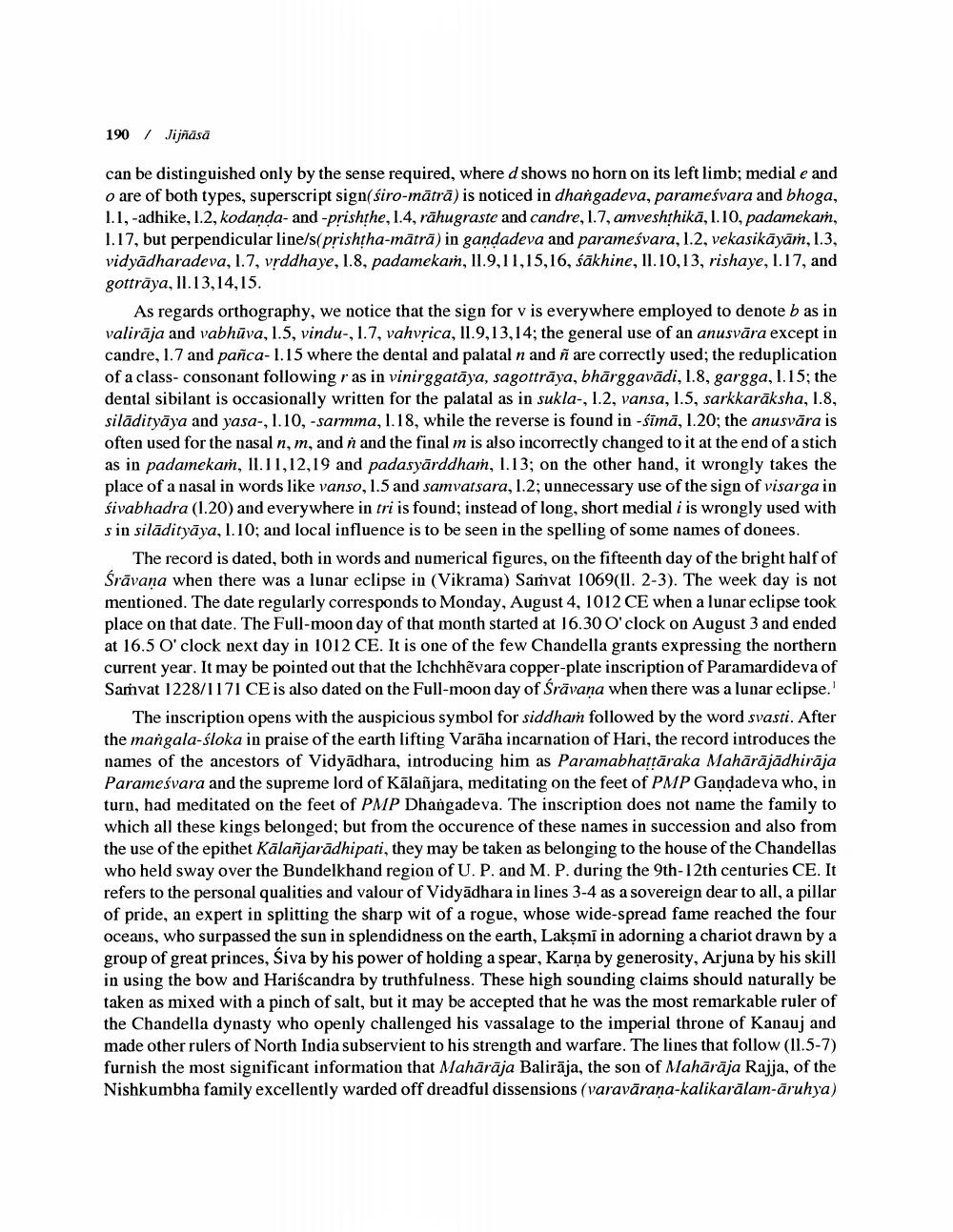________________
190 / Jijñāsā
can be distinguished only by the sense required, where d shows no horn on its left limb; medial e and o are of both types, superscript sign(siro-matra) is noticed in dhangadeva, parameśvara and bhoga, 1.1, -adhike, 1.2, kodanda- and -prishthe, 1.4, rāhugraste and candre, 1.7, amveshṭhikā, 1.10, padamekam, 1.17, but perpendicular line/s(prishtha-mäträ) in gandadeva and parameśvara, 1.2, vekasikāyām, 1.3, vidyadharadeva, 1.7, vṛddhaye, 1.8, padamekam, 11.9,11,15,16, sakhine, II.10,13, rishaye, 1.17, and gottrāya, 11.13,14,15.
As regards orthography, we notice that the sign for v is everywhere employed to denote b as in valirāja and vabhūva, 1.5, vindu-, 1.7, vahvṛica, 11.9,13,14; the general use of an anusvāra except in candre, 1.7 and pañca- 1.15 where the dental and palatal n and ñ are correctly used; the reduplication of a class-consonant following r as in vinirggataya, sagottrāya, bhārggavādi, 1.8, gargga, 1.15; the dental sibilant is occasionally written for the palatal as in sukla-, 1.2, vansa, 1.5, sarkkarāksha, 1.8, silādityāya and yasa-, 1.10, -sarmma, 1.18, while the reverse is found in -śīmā, 1.20; the anusvāra is often used for the nasal n, m, and in and the final m is also incorrectly changed to it at the end of a stich as in padamekam, 11.11,12,19 and padasyarddham, 1.13; on the other hand, it wrongly takes the place of a nasal in words like vanso, 1.5 and samvatsara, 1.2; unnecessary use of the sign of visarga in sivabhadra (1.20) and everywhere in tri is found; instead of long, short medial i is wrongly used with s in silādityāya, 1.10; and local influence is to be seen in the spelling of some names of donees.
The record is dated, both in words and numerical figures, on the fifteenth day of the bright half of Śrāvaṇa when there was a lunar eclipse in (Vikrama) Samvat 1069(11. 2-3). The week day is not mentioned. The date regularly corresponds to Monday, August 4, 1012 CE when a lunar eclipse took place on that date. The Full-moon day of that month started at 16.30 O'clock on August 3 and ended at 16.5 O'clock next day in 1012 CE. It is one of the few Chandella grants expressing the northern current year. It may be pointed out that the Ichchhevara copper-plate inscription of Paramardideva of Samvat 1228/1171 CE is also dated on the Full-moon day of Śrāvana when there was a lunar eclipse.
The inscription opens with the auspicious symbol for siddham followed by the word svasti. After the mangala-śloka in praise of the earth lifting Varaha incarnation of Hari, the record introduces the names of the ancestors of Vidyadhara, introducing him as Paramabhaṭṭāraka Mahārājādhirāja Parameśvara and the supreme lord of Kalañjara, meditating on the feet of PMP Gandadeva who, in turn, had meditated on the feet of PMP Dhangadeva. The inscription does not name the family to which all these kings belonged; but from the occurence of these names in succession and also from the use of the epithet Kālañjarādhipati, they may be taken as belonging to the house of the Chandellas who held sway over the Bundelkhand region of U. P. and M. P. during the 9th-12th centuries CE. It refers to the personal qualities and valour of Vidyadhara in lines 3-4 as a sovereign dear to all, a pillar of pride, an expert in splitting the sharp wit of a rogue, whose wide-spread fame reached the four oceans, who surpassed the sun in splendidness on the earth, Lakṣmi in adorning a chariot drawn by a group of great princes, Siva by his power of holding a spear, Karna by generosity, Arjuna by his skill in using the bow and Hariścandra by truthfulness. These high sounding claims should naturally be taken as mixed with a pinch of salt, but it may be accepted that he was the most remarkable ruler of the Chandella dynasty who openly challenged his vassalage to the imperial throne of Kanauj and made other rulers of North India subservient to his strength and warfare. The lines that follow (11.5-7) furnish the most significant information that Mahārāja Balirāja, the son of Mahārāja Rajja, of the Nishkumbha family excellently warded off dreadful dissensions (varaväraṇa-kalikarālam-āruhya)




